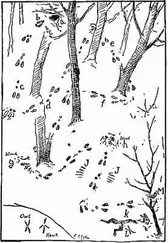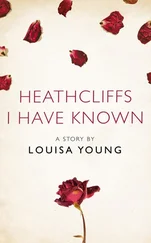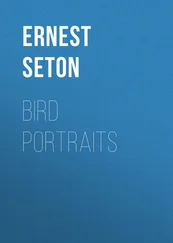Ernest Seton - Wild Animals I Have Known
Здесь есть возможность читать онлайн «Ernest Seton - Wild Animals I Have Known» весь текст электронной книги совершенно бесплатно (целиком полную версию без сокращений). В некоторых случаях можно слушать аудио, скачать через торрент в формате fb2 и присутствует краткое содержание. Год выпуска: 2001, Жанр: Природа и животные, на английском языке. Описание произведения, (предисловие) а так же отзывы посетителей доступны на портале библиотеки ЛибКат.
- Название:Wild Animals I Have Known
- Автор:
- Жанр:
- Год:2001
- ISBN:нет данных
- Рейтинг книги:5 / 5. Голосов: 1
-
Избранное:Добавить в избранное
- Отзывы:
-
Ваша оценка:
- 100
- 1
- 2
- 3
- 4
- 5
Wild Animals I Have Known: краткое содержание, описание и аннотация
Предлагаем к чтению аннотацию, описание, краткое содержание или предисловие (зависит от того, что написал сам автор книги «Wild Animals I Have Known»). Если вы не нашли необходимую информацию о книге — напишите в комментариях, мы постараемся отыскать её.
Wild Animals I Have Known — читать онлайн бесплатно полную книгу (весь текст) целиком
Ниже представлен текст книги, разбитый по страницам. Система сохранения места последней прочитанной страницы, позволяет с удобством читать онлайн бесплатно книгу «Wild Animals I Have Known», без необходимости каждый раз заново искать на чём Вы остановились. Поставьте закладку, и сможете в любой момент перейти на страницу, на которой закончили чтение.
Интервал:
Закладка:
Next day the blood-quills had sprouted the tips of feathers. On the next, the feathers were well Out, and a week later the whole family of down-clad babies were strong on the wing.
And yet not all—poor little Runtie had been sickly from the first. He bore his half-shell on his back for hours after he came out; he ran less and cheeped more than his brothers, and when one evening at the onset of a skunk the mother gave the word 'Kwit, kwit' (Fly, fly), Runtie was left behind, and when she gathered her brood on the piney hill he was missing, and they saw him no more.
Meanwhile, their training had gone on. They knew that the finest grasshoppers abounded in the long grass by the brook; they knew that the currant-bushes dropped fatness in the form of smooth, green worms; they knew that the dome of an ant-hill rising against the distant woods stood for a garner of plenty; they knew that strawberries, though not really insects, were almost as delicious; they knew that the huge danaid butterflies were good, safe game, if they could only catch them, and that a slab of bark dropping from the side of a rotten log was sure to abound in good things of many different kinds; and they had learned, also, that yellow-jackets, mud-wasps, woolly worms, and hundred-leggers were better let alone.
It was now July, the Moon of Berries. The chicks had grown and flourished amazingly during this last month, and were now so large that in her efforts to cover them the mother was kept standing all night.
They took their daily dust-bath, but of late had changed to another higher on the hill. It was one in use by many different birds, and at first the mother disliked the Idea of such a second-hand bath. But the dust was of such a fine, agreeable quality, and the children led the way with such enthusiasm, that she forgot her mistrust.
After a fortnight the little ones began to droop and she herself did not feel very well. They were always hungry, and though they ate enormously, they one and all grew thinner and thinner. The mother was the last to be affected. But when it came, it came as hard on her—a ravenous hunger, a feverish headache, and a wasting weakness. She never knew the cause. She could not know that the dust of the much-used dust-bath, that her true instinct taught her to mistrust at first, and now again to shun, was sown with parasitic worms, and that all of the family were infested.
No natural impulse is without a purpose. The mother-birds knowledge of healing was only to follow natural impulse. The eager, feverish craving for something, she knew not what, led her to eat, or try, everything that looked eatable and to seek the coolest woods. And there she found a deadly sumac laden with its poison fruit.
A month ago she would have passed it by, but now she tried the unattractive berries. The acrid burning juice seemed to answer some strange demand of her body; she ate and ate, and all her family joined in the strange feast of physic. No human doctor could have hit it better; it proved a biting, drastic purge, the dreadful secret foe was downed, the danger passed. But not for all—Nature, the old nurse, had come too late for two of them. The weakest, by inexorable law, dropped out. Enfeebled by the disease, the remedy was too severe for them. They drank and drank by the stream, and next morning did not move when the others followed the mother. Strange vengeance was theirs now, for a skunk, the same that could have told where Runtie went, found and devoured their bodies and died of the poison they had eaten.
Seven little partridges now obeyed the mother's call. Their individual characters were early shown and now developed fast. The weaklings were gone, but there were still a fool and a lazy one. The mother could not help caring for some more than for others, and her favorite was the biggest, he who once sat on the yellow chip for concealment. He was not only the biggest, strongest, and handsomest of the brood, but best of all, the most obedient. His mother's warning 'rrrrr' (danger) did not always keep the others from a risky path or a doubtful food, but obedience seemed natural to him, and he never failed to respond to her soft 'K-reet' (Come), and of this obedience he reaped the reward, for his days were longest in the land.
August, the Molting Moon, went by; the young ones were now three parts grown. They knew just enough to think themselves wonderfully wise. When they were small it was necessary to sleep on the ground so their mother could shelter them, but now they were too big to need that, and the mother began to introduce grownup ways of life. It was time to roost in the trees. The young weasels, foxes, skunks, and minks were beginning to run. The ground grew more dangerous each night, so at sundown Mother Partridge called 'K-reet,' and flew into a thick, low tree.
The little ones followed, except one, an obstinate little fool who persisted in sleeping on the ground as heretofore. It was all right that time, but the next night his brothers were awakened by his cries. There was a slight scuffle, then stillness, broken only by a horrid sound of crunching bones and a smacking of lips. They peered down into the terrible darkness below, where the glint of two close-set eyes and a peculiar musty smell told them that a mink was the killer of their fool brother.
Six little partridges now sat in a row at night, with their mother in the middle, though it was not unusual for some little one with cold feet to perch on her back.
Their education went on, and about this time they were taught 'whirring.' A partridge can rise on the wing silently if it wishes, but whirring is so important at times that all are taught how and when to rise on thundering wings. Many ends are gained by the whirr. It warns all other partridges near that danger is at hand, it unnerves the gunner, or it fixes the foe's attention on the whirrer, while the others sneak off in silence, or by squatting, escape notice.
A partridge adage might well be 'foes and food for every moon.' September came, with seeds and grain in place of berries and ant-eggs, and gunners in place of skunks and minks.
The partridges knew well what a fox was, but had scarcely seen a dog. A fox they knew they could easily baffle by taking to a tree, but when in the Gunner Moon old Cuddy came prowling through the ravine with his bob-tailed yellow cur, the mother spied the dog and cried out, 'Kwit! kwit!' (Fly, fly). Two of the brood thought it a pity their mother should lose her wits so easily over a fox, and were pleased to show their superior nerve by springing into a tree in spite of her earnestly repeated 'Kwit! kwit!' and her example of speeding away on silent wings.
Meanwhile, the strange bob-tailed fox came under the tree and yapped and yapped at them. They were much amused at him and at their mother and brothers, so much that they never noticed a rustling in the bushes till there was a loud Bang! bang! and down fell two bloody, flopping partridges, to be seized and mangled by the yellow cur until the gunner ran from the bushes and rescued the remains.
III
Cuddy lived in a wretched shanty near the Don, north of Toronto. His was what Greek philosophy would have demonstrated to be an ideal existence. He had no wealth, no taxes, no social pretensions, and no property to speak of. His life was made up of a very little work and a great deal of play, with as much outdoor life as he chose. He considered himself a true sportsman because he was 'fond o' huntin',' and 'took a sight o' comfort out of seem' the critters hit the mud, when his gun was fired. The neighbors called him a squatter, and looked on him merely as an anchored tramp. He shot and trapped the year round, and varied his game somewhat with the season perforce, but had been heard to remark he could tell the month by the 'taste o' the partridges,' if he didn't happen to know by the almanac. This, no doubt, showed keen observation, but was also unfortunate proof of something not so creditable. The lawful season for murdering partridges began September 15th, but there was nothing surprising in Cuddy's being out a fortnight ahead of time. Yet he managed to escape punishment year after year, and even contrived to pose in a newspaper interview as an interesting character.
Читать дальшеИнтервал:
Закладка:
Похожие книги на «Wild Animals I Have Known»
Представляем Вашему вниманию похожие книги на «Wild Animals I Have Known» списком для выбора. Мы отобрали схожую по названию и смыслу литературу в надежде предоставить читателям больше вариантов отыскать новые, интересные, ещё непрочитанные произведения.
Обсуждение, отзывы о книге «Wild Animals I Have Known» и просто собственные мнения читателей. Оставьте ваши комментарии, напишите, что Вы думаете о произведении, его смысле или главных героях. Укажите что конкретно понравилось, а что нет, и почему Вы так считаете.





